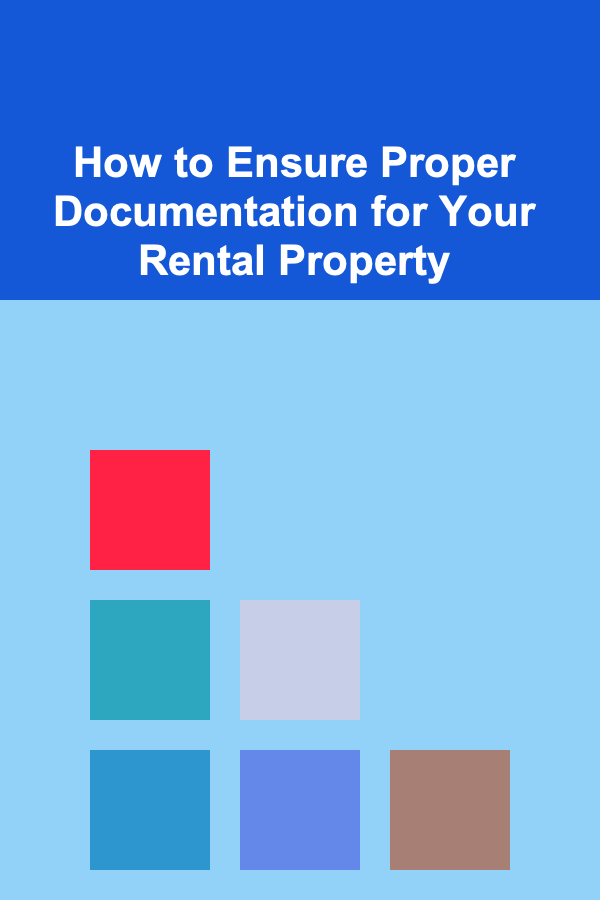
How to Ensure Proper Documentation for Your Rental Property
ebook include PDF & Audio bundle (Micro Guide)
$12.99$9.99
Limited Time Offer! Order within the next:

Owning rental property can be a lucrative venture, but it also comes with a multitude of responsibilities, especially when it comes to maintaining proper documentation. Whether you are a new landlord or an experienced one, keeping thorough and organized records for your rental property is crucial for several reasons. From legal compliance and tax purposes to ensuring smooth interactions with tenants, having proper documentation helps to safeguard both your property and your interests.
In this guide, we will explore the importance of proper documentation for rental properties and provide actionable steps to help you manage your records effectively.
Why Proper Documentation is Crucial for Rental Property Owners
Proper documentation serves as a foundation for running a successful rental property business. Below are some of the key reasons why it is essential:
1. Legal Compliance
Laws governing rental properties vary by location, but in general, landlords are required to maintain certain records to comply with legal requirements. These laws may cover areas such as:
- Rent payments and security deposits
- Lease agreements and contract terms
- Property inspections and maintenance records
- Health and safety regulations
Failure to keep the necessary documentation can lead to legal disputes, fines, or even lawsuits. Properly documenting your interactions and agreements with tenants, along with maintaining required certifications and inspections, helps you avoid these legal pitfalls.
2. Tax and Financial Management
As a property owner, your rental income is subject to taxation. In order to maximize your tax deductions and avoid overpaying, it's crucial to keep accurate financial records. These records should include:
- Income from rent
- Expenses related to property maintenance, repairs, and management
- Depreciation on your property
- Property taxes and insurance
Having well-documented financial records will not only make filing your taxes easier, but it will also help you track your property's profitability and manage expenses more effectively.
3. Dispute Resolution
Tenant disputes are an unfortunate part of property management, but having proper documentation can help resolve issues quickly and fairly. Common disputes involve rent payment discrepancies, security deposit returns, and maintenance issues. In these cases, well-kept records will serve as proof of what was agreed upon and can help protect your interests.
4. Property Management Efficiency
Having organized documentation will make your day-to-day property management tasks more efficient. Whether you're dealing with repairs, lease renewals, or tenant communication, having quick access to the right documents will save you time and reduce stress.
Types of Documentation Every Landlord Should Maintain
To ensure comprehensive record-keeping, landlords should maintain the following types of documents for each rental property:
1. Lease Agreements
The lease agreement is the cornerstone of your relationship with your tenants. This document outlines the terms and conditions of the rental arrangement, including:
- The rental amount and due date
- The duration of the lease
- Responsibilities for maintenance and repairs
- Terms for breaking or renewing the lease
- Tenant rules and regulations (e.g., no smoking or no pets)
Make sure to have a legally binding lease agreement signed by both parties before the tenant moves in. It's also important to keep a copy of this agreement on file for the duration of the lease and for a period after it ends, as it may be needed in case of disputes.
2. Rent Payment Records
You should keep detailed records of all rent payments made by tenants, including the following:
- Amount of rent paid
- Payment date
- Method of payment (check, bank transfer, cash, etc.)
- Any late fees or adjustments made
These records will be useful for tax purposes and for resolving any disputes regarding rent payments. Consider using property management software to streamline rent collection and record-keeping.
3. Security Deposit Documentation
A security deposit protects landlords in the event that a tenant causes damage to the property. It's important to have clear documentation of the security deposit, including:
- The amount of the deposit
- The condition of the property when the tenant moved in (this should be documented in a move-in inspection report)
- Any deductions made from the deposit at the end of the lease (such as for cleaning or repairs)
In many places, laws govern how security deposits must be handled, including how long you can keep the deposit and what must be returned to the tenant. Familiarize yourself with these laws and ensure your security deposit documentation complies with local regulations.
4. Property Inspection Reports
Regular inspections of your rental property are essential for maintaining the condition of the property and identifying any potential maintenance issues before they become serious problems. Keep detailed records of each inspection, including:
- Date and time of the inspection
- The condition of the property (including photographs if possible)
- Any repairs or maintenance needed
- Communication with the tenant regarding the inspection
These reports can help ensure that the property is well-maintained and can serve as evidence in case of disputes over property damage or maintenance issues.
5. Maintenance and Repair Records
Properly documenting maintenance and repair work is important for a few reasons:
- It helps track the condition of the property.
- It ensures that repairs are completed on time and by qualified professionals.
- It serves as evidence in case of disputes over responsibility for damages.
For each repair or maintenance task, document the following:
- Date of the service
- Description of the work done
- Cost of repairs
- The name of the contractor or service provider
This information can help you keep the property in good shape, plan future maintenance, and demonstrate that you've met your responsibilities as a landlord.
6. Tenant Communication
Effective communication is crucial for maintaining good tenant relations. Keep records of all communications with your tenants, including:
- Emails, texts, or phone calls about rent payments, maintenance requests, or complaints
- Notices of eviction or other legal communications
- Lease renewal offers or updates
Documenting these communications can help avoid misunderstandings and can also serve as evidence in the event of disputes.
7. Tax and Financial Records
As a rental property owner, you'll need to keep financial records for tax purposes. These documents should include:
- Rent income receipts
- Records of property-related expenses (maintenance, repairs, insurance, property management fees)
- Mortgage interest payments
- Depreciation schedules
Properly maintaining these records will not only help you file accurate tax returns but also enable you to identify potential areas for cost savings and investment opportunities.
8. Insurance Documentation
Landlords are encouraged to carry property insurance to protect their investments from damage. Keep documentation of:
- Insurance policy details
- Coverage amounts
- Premium payments
- Any claims made
Having this documentation on hand ensures that you can quickly file a claim in case of property damage or loss.
Tips for Keeping Documentation Organized
Now that we've discussed the essential types of documentation, let's look at some best practices for keeping everything organized:
1. Use Property Management Software
Property management software can help you keep all your documents organized in one place. Many platforms offer features such as:
- Rent payment tracking
- Lease agreement storage
- Maintenance request management
- Tax report generation
Using software can save you time, reduce paperwork, and make it easier to access important documents whenever you need them.
2. Create a Filing System
If you prefer to keep physical copies of your documents, create a well-organized filing system. You can use folders, binders, or file cabinets to separate your documents by category, such as:
- Tenant records
- Lease agreements
- Repair invoices
- Tax documents
Ensure that all documents are stored in a secure and easily accessible location. It's also important to keep backup copies of important documents in case of loss or damage.
3. Maintain Digital Copies
In addition to physical copies, consider keeping digital copies of all documents. Scanning documents and saving them in organized folders on your computer or in cloud storage can reduce clutter and make it easier to find what you need. Cloud storage services like Google Drive, Dropbox, or OneDrive allow you to store documents securely and access them from anywhere.
4. Regularly Update Your Records
Ensure that your records are kept up to date by reviewing them regularly. After each tenant move-in or move-out, update your lease agreements, security deposit information, and inspection reports. Similarly, update your tax records and maintenance logs after each transaction.
5. Protect Tenant Privacy
While keeping detailed records is important, it's equally important to protect your tenants' privacy. Store sensitive information, such as Social Security numbers or financial details, in secure, password-protected files or physical safes.
Conclusion
Proper documentation is essential for managing rental properties effectively. From legal compliance and tax management to resolving disputes and maintaining the property, good record-keeping provides landlords with the tools they need to succeed. By organizing your documentation, keeping accurate records, and using technology to your advantage, you can streamline your property management processes and reduce stress.
Remember, while it may seem tedious at times, keeping proper documentation is an investment in your property's long-term success and helps ensure that your rental business remains legally sound and financially viable.
Reading More From Our Other Websites
- [Gardening 101] The Benefits of a No-Dig Garden: Why It's the Future of Gardening
- [Organization Tip 101] How to Store and Organize Guitar Picks and Capos
- [Gardening 101] Troubleshooting Common Rose Garden Problems: Pest Control and Disease Prevention
- [Personal Finance Management 101] How to Save Money on Transportation Costs Without Compromising Convenience
- [Home Budget Decorating 101] How to Incorporate Technology into Home Decor Affordably
- [Organization Tip 101] How to Organize Your Fitness and Health Goals
- [Home Maintenance 101] How to Clean and Maintain Your Home's Gutters
- [Personal Care Tips 101] How to Make Your Own Natural Nail Polish Remover at Home
- [Biking 101] Top 5 Cycling Training Tips for Improved Speed and Endurance
- [Home Budget Decorating 101] How to Turn Your Small Apartment into a Stylish Sanctuary on a Budget

How To Build a Personal Brand as a Remote Professional
Read More
How to Clean and Maintain Your Home's Fans and Ventilation
Read More
How to Create a Capsule Wardrobe for Each Season
Read More
How to Use Drawer Inserts for Optimal Space Management
Read More
How to Prioritize Tasks on Your Volunteer Work To-Do List
Read More
How to Improve Your Table Tennis Backhand Loop
Read MoreOther Products

How To Build a Personal Brand as a Remote Professional
Read More
How to Clean and Maintain Your Home's Fans and Ventilation
Read More
How to Create a Capsule Wardrobe for Each Season
Read More
How to Use Drawer Inserts for Optimal Space Management
Read More
How to Prioritize Tasks on Your Volunteer Work To-Do List
Read More